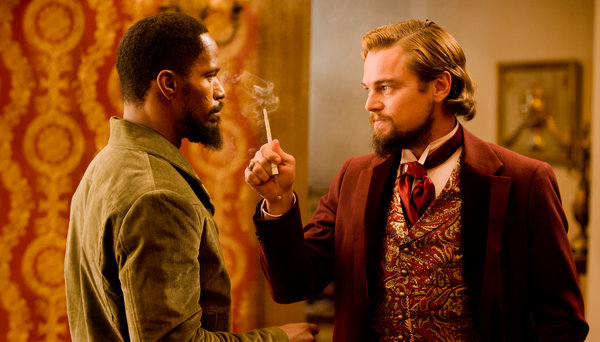LOS ANGELES — On Nov. 6 a contentious election season will presumably come
to a close. But we’ll still have the movies to fight about.
Last year “The Artist,” a silent Hollywood fairy tale, danced to a best picture Oscar in a nostalgic awards season. But films will be crackling with tension this fall and winter, as a number of high-profile pictures tackle tough, sometimes violent, sometimes politically tinged subject matter, while sorting through the usual traffic jams and rivalries on their way to the screen.
The season’s tone is almost certain to be set by Harvey Weinstein and his Weinstein Company, an Oscar powerhouse that backed “The Artist” last year and a year earlier released “The King’s Speech,”another bit of heartfelt nostalgia that also became an Oscar-winning best picture.
At the Comic-Con International fan convention in July, Weinstein offered a glimpse of“Django Unchained,” one of its awards candidates for 2012. Written and directed by Quentin Tarantino, it is a bloody fable about a former slave, played by Jamie Foxx, who hunts white overseers in search of a lost love, played by Kerry Washington.
“It can’t be much more nightmarish than it was in real life,” said Mr. Tarantino, who was trying to describe his film’s celebration of deadly vengeance — he called it “spaghetti surrealism” — in the Old South.
Set for release on Christmas Day, the film was being talked up at Comic-Con by Weinstein representatives as a contender on the order of Mr. Tarantino’s “Inglourious Basterds,”which featured Mr. Tarantino as a scalped Nazi, had a climactic scene of movie theater violence and received eight Oscar nominations in 2010. (Last week Mr. Weinstein called for a Hollywood discussion of the effects of violence on screen. )
But to be a winner, “Django Unchained” will have to edge aside “Lawless,” directed by John Hillcoat, about bootlegging gangsters in Prohibition-era Virginia; “The Master,” directed by Paul Thomas Anderson, about a drunken drifter who falls in with a cult leader who resembles L. Ron Hubbard, the real-life Scientology founder; and “Silver Linings Playbook,” directed by David O. Russell, about an unemployed teacher just back from a state mental hospital.
In addition, there’s “Killing Them Softly,” Andrew Dominik’s story about a hit man investigating a heist from the mob. And those are just the films on Mr. Weinstein’s schedule through the year’s end.
The producer Megan Ellison, who backed both “Lawless” and “The Master,” is also helping to finance “Zero Dark Thirty.” Written by Mark Boal, directed by Kathryn Bigelow and set for release by Sony Pictures Entertainment on Dec. 19, it tells of the hunt for Osama bin Laden.
“Zero Dark Thirty” was originally supposed to open in October. But the film was delayed until after the election amid claims by Republicans — and denials from the Obama administration — that Mr. Boal and Ms. Bigelow had been given undue access to classified information that might help them dramatize one of the president’s achievements at a crucial political moment.
The push and shove of politics may now touch another film, Steven Spielberg’s “Lincoln.” The movie, with its portrayal of a would-be national unifier under siege, was recently scheduled by DreamWorks Studios and Walt Disney for limited release on Nov. 9, with more theaters to follow the next week.
In a narrow sense that keeps Mr. Spielberg’s earlier promise to hold the film until after the election. But it opens the possibility of contemporary comparisons and partisan debate as the inevitable prerelease publicity for the movie begins just as voters head to the polls. (Mr. Spielberg’s films typically have not played the fall festival circuit, and it does not appear that “Lincoln” will break that pattern.)
Marvin Levy, Mr. Spielberg’s spokesman, said “we wouldn’t be surprised” if there were political discussion around “Lincoln.” But the film, he said, is more about leadership than about particular policy positions, and the need to circulate trailers would probably cause talk even if it were to be released later.
“We’d be part of all that, no matter what,” Mr. Levy said.
Mr. Weinstein is apparently less concerned about political strife. His company’s “Butter,” a comedy with anti-Tea Party overtones, was screened at festivals last year but is set for commercial release on Oct. 5, in the election’s full heat.
At 20th Century Fox publicists have been bracing for months in anticipation of controversy around “Won’t Back Down,” which was produced by Walden Media. The film stars Viola Davis and Maggie Gyllenhaal in a drama about parents and teachers who take over a failing school through a parent trigger law. (The fictionalized situation posits a law somewhat like California’s trigger statute, which allows parents to turn a school into acharter school, replace the staff or even shut it down if 51 percent of the families involved agree.)
Two years ago Walden ran into criticism from some teachers and union leaders because it was among the backers of an education-reform documentary, “Waiting for ‘Superman.’ ” Though “Won’t Back Down,” with similar themes, will not open until Sept. 28, union leaders have already expressed wariness, and opinion writers are lining up for a look, according to people who were briefed on the studio’s release plans but spoke anonymously because of the controversy surrounding the subject.
Inevitably, this season’s documentaries, beginning with an expected crop at the Toronto International Film Festival in early September, will bring more tough discussion. Among the toughest of the films, it appears, will be “Mea Maxima Culpa: Silence in the House of God.” Directed by Alex Gibney, an Oscar winner in 2008 for “Taxi to the Dark Side,” and set for fall release by HBO Documentary Films, it examines the priestly abuse of deaf children at a Wisconsin school, and the case’s handling by the Vatican.
“The film is explosive,” said a promotional message that arrived by e-mail last week.
Less explosive, it appears, will be any interplay between two customary seasonal rivals, Mr. Weinstein and the producer Scott Rudin. The two squared off in the past over conflicting plans for the release of “The Reader,” with which they were both at one point involved, and then they competed fiercely for Oscars in 2010, when Mr. Rudin had “The Social Network” up against “The King’s Speech.”
In an e-mail last week, Mr. Rudin called it “very unlikely” that his “Inside Llewyn Davis,” a period drama from Joel and Ethan Coen about a folk singer in New York during the 1960s, would be screened in the coming awards season.
Another near miss involves Barbra Streisand and Bette Midler. Ms. Streisand stars in a comedy, “The Guilt Trip,” currently to be released by Paramount Pictures on Christmas Day; Ms. Midler has a comedy of her own, “Parental Guidance,” scheduled by Fox a few weeks earlier, on Thanksgiving.
But two divas. One holiday season.
Things might get tense.
.gif)




.jpg)


